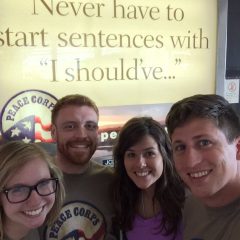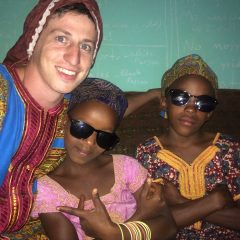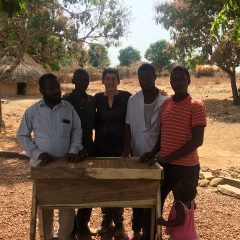EcoLeague Alumni Profile: Travis Sherlin, Northland College ’15
Travis Sherlin graduated from Northland College in 2015, distinguishing himself by completing two EcoLeague exchanges, one at Prescott College (Spring 2014) and another at Dickinson College (Spring 2015). He currently works as an agroforester for the Peace Corps in Guinea, West Africa. We recently caught up with Travis to learn more about sustainable community development, developing his own class, and the impact EcoLeague had on his current work:
How did you get involved with EcoLeague?
As soon as I heard about EcoLeague, I knew I wanted to do it. How often do you get the chance to see more of the world without drastically changing your life plans? I was able to study exactly what I wanted, without having to navigate a precarious tuition cost switch, and see more of the beautiful US.
Why did you choose to study at Dickinson and Prescott?
I chose to study at Prescott because of a program that I had heard very high acclaim for—the social justice education block in Tucson with [Director of Prescott College Tucson] Anita Fernández. My plans were never to study education. Instead, I was interested in sustainable community development. Fortunately, I had the foresight to understand that socially just education looked very similar to socially just planning. Of all my education, that block has proven to be one of the most impactful, transformative, and enlightening. I’m very grateful for Dr. Fernández, her associates, and all their work. A huge bonus to that academically and emotionally rigorous course was the physically challenging rock climbing semester that preceded it. What luck to be able to work your academic and physical muscles in the same semester!
I chose Dickinson College, similarly, for its amazing course list and prestige. [Assistant Professor of Women’s, Gender, and Sexuality Studies] Katie Oliviero is a professor that challenged me like few others. Inside her course covering gender, migrations, and feminisms, every one of my conceptions on those three topics was challenged. Dr. Oliviero has a gentle but firm way of calling perceptions into question and pushing you to stretch your mind to own a fuller understanding of the course topics and the world around us. Her class was intimidating in the best way. I was pushed and I’m grateful for it. Too often, college students are graded on completing coursework regardless of whether learning occurred or not. Dr. Oliviero values academic growth as all professors ought to.
What kinds of academic work or research did you do while on exchange?
EcoLeague offered me the opportunity to create a class with a colleague of mine entitled “Advanced Readings in Urban Political Economy.” Through this course we were allowed to visit major cities around the northeastern US like New York City and Philadelphia, and in tandem with reading excellent scholarly works on city planning, evaluating and transcribing our perceptions and ideas of the cities we saw. This allowed us to take the years of readings and course work about city planning we had done and apply those ideas to our critiques of modern cities we visited. Brian Tochterman [Northland College Assistant Professor of Sustainable Community Development] did an excellent job of encouraging us to perceive and critique the world around us on a micro and macro scale.
What’s your favorite program memory from outside the classroom?
There were many wonderful memories that were made possible by EcoLeague. Rock climbing Moby Dick, a five pitch climb to a gorgeous vista and a 200 foot free repel at the Cochise Stronghold in Southern Arizona; real moments of incredibly difficult but life-changing epiphanies or revelations brought on by the help of fellow classmates; forging strong bonds with [Dickinson’s] local community of Carlisle by bartending at one of their finest Italian eateries, Trattoria Piatto; or working with groups that support undocumented students in the US. EcoLeague provided me with a plethora of truly incredible opportunities that I never would have had access to otherwise.

Have your EcoLeague experiences helped prepare you for your current work with the Peace Corps? How so? Any future plans?
I’m currently serving as an agroforester with the Peace Corps in Guinea, West Africa and I’m certain that Dr. Oliviero’s course gave me an educational prologue to understanding the very complex and tangled history of colonization, migrations, and milieu of places such as this. It has allowed me a very special perspective with which to view the modern history of Guinea. Likewise, a student of some excellent Community Development teachers like [Northland Associate Professor of Sustainable Community Development] Brandon Hofstedt and Brian Tochterman at Northland College, my position as a Peace Corps volunteer is not simple. I have a byzantine relationship with local development politics and have a whole new appreciation for international development work now that I’ve been working at the grassroots level for two years. I owe any success I’ve realized here to the whole of my education with emphasis on my EcoLeague experiences.
What advice do you have for students interested in EcoLeague?
Do it! It can break up monotony that sometimes accompanies academically rigorous schedules. It immediately inflates your course catalogue and options three or four-fold. Moreover, who doesn’t want to expand their geo-social perspective of the world and at the same time take incredible classes by incredible professors? It’s too good an opportunity to pass up.
Interview conducted by EcoLeague Communications and Digital Media Assistant Claire Jeantheau, Dickinson ’21

